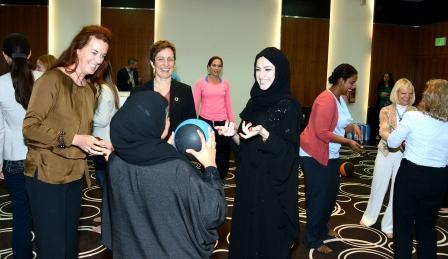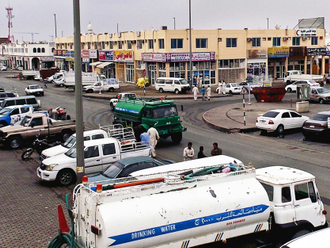
In late October, the World Economic Forum released the Global Gender Gap Report 2014, which ranks nations on gender-based disparities across areas such as health care, education, political participation, economic equality and the progress they make. Four years after the Arab Spring, no Arab country has made it to the top 100. Qatar ranks 116. The Arab Spring showcased the strength of Arab women who pinned their hopes on political reforms to bring about gender equality. As some countries in the region are still grappling with the political fallout of the uprisings, it has become more clear than ever that a country can’t maximise its socio-economic performance by excluding its women.
The economically forward GCC states are now taking the lead in the empowerment of women in the Arab world, with Qatar at the forefront.
Armed with education
“The first step is always education. By allowing international universities to set up campuses here, women no longer have to face the conflict of leaving home to study abroad,” says Carolin Zeitler, Founder and CEO of Tataowar, a coaching and consulting company.
Qatar Foundation established Education City with an aim to provide world-class education to Qatari men and women.
When Zeitler arrived in Doha in 2007, she didn’t find support for professional women, which led her to set up the How Women Work community in 2010. “Qatari women have the resources, the means, and even a great role model. They call themselves the Shaikha Mouza Bint Nasser Al Misned generation,” adds Zeitler.
This enthusiasm, along with government initiatives, a thrust towards Qatarisation and a keen backing for start-ups, is seeing Qatari women move away from what Zeitler calls the abaya-cupcake business model to more serious ventures and active political participation.
“At this stage Qatar is on the right track, in terms of having the right education system and a strong platform that enables Qatari women to grow in the business field,” says Buthaina Al Ansari, Senior Director — Human Resources at Ooredoo, a leading telecommunications provider. “But we need to revisit our human resource policies as well as the regulations and systems in the government, even though every year triple the percentage of Qatari women graduate compared to men.”
Buthaina is a member of the Mena Business Women’s Networks and an ambassador of Women Leading Change Qatar, a network that was set up to mobilise a dynamic group of leaders and entrepreneurs in Qatar to support diversity and inclusion as part of the social and human development targets in Qatar’s National Vision 2030.
But for all their education, only 35 per cent of Qatari women are found in the workforce, a severe under-representation that the government is aiming to correct by bringing female participation up to 42 per cent by 2016.
Rachel Petero, founder, Women Leading Change Qatar, believes that as an emerging nation, Qatar has understood that empowering women is a key component of its progressive vision. “For me Qatar is the perfect balance between Saudi Arabia and the UAE. From Shaikha Mouza who first stepped out into mainstream media almost 15 years ago to young Qatari women who are choosing dynamic fields such as engineering, political affairs and computer science, Qatari women are leading change within their cultural framework.”
And the times are indeed changing. In March, the Qatar Business Incubation Centre (QBIC), a joint venture between the Qatar Development Bank (QDB) and the Social Development Centre, was launched. QBIC is the largest mixed business incubator in the Middle East.
Perfect platform
“Globally, the perception of successful Arab women is changing for the better,” says Aisha Al Mudahka, CEO, QBIC. “Women in Qatar today have plenty of opportunities to start their own businesses and this past year saw an increase in the number of female applicants at QBIC. Qatari women are just as capable and competent as their male counterparts and in fact 60 per cent of our applications have come from ambitious female entrepreneurs.”
Aisha represented QBIC and Qatar at the Women’s Entrepreneurship Day at the United Nations in New York on November 19.
There are other organisations that help support women in pursuing their dreams of becoming entrepreneurs. QDB, a not-for-profit organisation, is committed to supporting entrepreneurship in the private sector. The Bedaya Centre for Entrepreneurship and Career Development, established in September 2011, is a joint initiative between Silatech, a social initiative that works to create jobs for young people throughout the Arab world and QDB that helps identify, develop and support young entrepreneurs to succeed in the business environment; Qatar Finance and Business Academy, the educational arm of the Qatar Financial Centre Authority has been developed to create a Qatar-based learning and development organisation.
Then there is the Roudha Centre, which is the only women entrepreneurship and leadership centre for women in the GCC that is non-government and a non-profit centre. “Qatar’s Vision 2030 has the mandate to empower and promote Qatari women,” says Shareefa Fadhel, Co-Founder and CEO, Roudha Centre for Entrepreneurship and Innovation. “But I believe Qatari women have always been empowered, if you look at the education levels from the 70s to date, women are more educated than men. And what is education if not empowerment.”
Unique challenges
Yet, the issue of women’s empowerment in Qatar cannot be viewed with the same lens as in the West. “Throughout the world women have their own unique challenges,” says Shaikha Al Anoud Bint Hamad Al Thani, member of the royal family and Country Operations Manager, Silatech. “That’s perhaps the case in our region and in Qatar, where cultural objections have sometimes served to isolate women and prevent us from playing a full role in society.”
Dr Amal Mohammad Al Malki, Executive Director, Translation and Interpreting Institute, Hamad Bin Khalifa University, Qatar Foundation, says Qatari women have to work round cultural and legal obstacles to achieve their full potential. “Some of the challenges are the patriarchal culture that relegates women to an inferior status and the society’s negative perception of working women, the cultural restriction on her mobility, and the promotion of traditional gender roles,” says Dr Amal.
“But first, women need to be educated about their rights to be able to claim them, and thus there is a dire need to empower women in Qatar,” adds Dr Amal.






